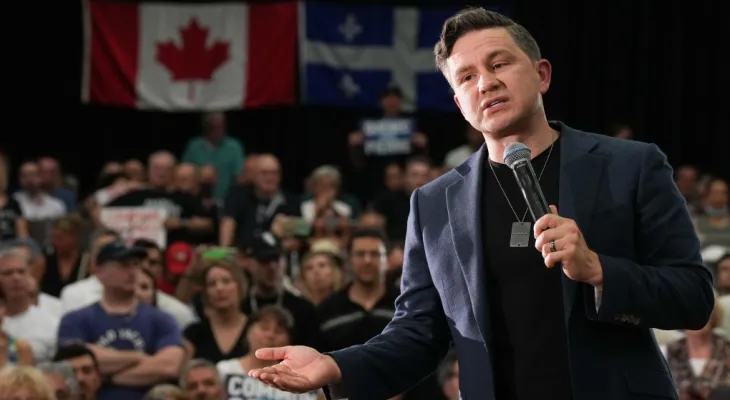Search here
Newspaper
Search here

Arab Canada News
News

Published: August 7, 2024
The conservatives insisted that they have no connection to a series of clearly similar posts on social media that flooded the X platform following the Peever Poilievre event in Northern Ontario last week.
The leader of the conservatives held a rally at a conference center in Kirkland Lake on July 31, in what appears to be a video showing a room packed with several hundred people.
Three days later, the platform formerly known as Twitter was inundated with hundreds of posts from individuals claiming they had "just returned" from the rally and that they "felt energized."
The posts came from accounts with fewer than five followers, many of which joined the platform just this month. Very few of them listed a current location in Canada, and many had already been disabled by Tuesday morning.
Charlie Angus, the NDP MP whose riding includes Timmins-James Bay and Kirkland Lake, said the flood raises questions about whether the conservatives had hired a bot farm "to create a false impression of momentum" for Poilievre in the riding.
Sarah Fischer, the communications director for the conservatives, accused the NDP of "spreading unfounded conspiracy theories."
Fischer stated in a written statement: "The Communist Party of Canada does not pay for bots and has no idea who is behind these accounts." "We aim to garner the support of real Canadians, as evidenced by the large turnout at our events."
Poilievre is making a strong push to win seats in Northern Ontario, including Timmins-James Bay, where Angus is not seeking re-election after representing the area for two decades. The Kirkland Lake stop was one of several that Poilievre made during his Northern Ontario tour in the last week of July.
Fischer noted that similar bot accounts were posting positive comments about Prime Minister Justin Trudeau and provided a link to several accounts that contained nearly identical posts expressing "disgust" over negative attacks against Trudeau and describing him as "our best Prime Minister ever."
She also pointed out that two of the bot accounts that posted about Poilievre's rally also posted about things she said were "not flattering to the conservative leader."
The accounts she linked to included posts calling for action on climate change, complaints about unions, and love and pickleball, as well as a recent shift to whole grain bread and pasta, and elections and politics in Germany, Australia, and Venezuela.
Fischer did not respond when asked whether the party was requesting X to take any action regarding the posts. A media request submitted to X received an automated, unsigned response saying, "Busy now, please check back later."
Duan Bratt, a political science professor at Mount Royal University in Calgary, said that the hundreds of accounts that posted about Poilievre's rally "have all the hallmarks" of being bots. They have a limited number of followers, and the handles usually consist of a name followed by a string of random letters or numbers, and if they have more than one post, the topics are heterogeneous.
Bratt noted that there have been similar bot activities in multiple countries for nearly a decade now. He said that trolls, who are often based in Russia and China, create dozens of fake accounts, mostly on X, and use them to sow chaos in other countries. This occurred during the Brexit referendum in the UK in 2016, and later that same year in the U.S. presidential elections.
Last month when wildfires swept through Jasper, Alberta, he said the bots immediately came out for both political sides. Some blamed Alberta Premier Danielle Smith for the disaster, while others blamed Trudeau.
Following the G7 leaders' summit in Quebec in 2018, Canada and its allies established the "G7 Rapid Response Mechanism" aimed at investigating potential incidents of foreign state-sponsored disinformation campaigns. In 2019, the mechanism reported a large, organized fake social media campaign in the Alberta provincial elections.
The Canadian Global Affairs Ministry did not respond to a question from the Canadian Press about whether the tweets regarding Poilievre's rally were under investigation.
Bratt said the goal is often not to create new divisions, but to amplify existing ones.
He said these divisions definitely affect Canadian politics, but often cannot be traced and are hard to stop. He noted that things have gotten worse since Elon Musk bought Twitter, eventually renaming it X. Musk has swept away some safety protocols and cut staff, including those responsible for overseeing trust and safety on the platform.
He advised social media consumers to pay attention to the accounts they read, and if an account is brand new, has a strange name, few posts, and comments on Canadian politics while being from another country, there's a good chance the account is a bot.
Comments